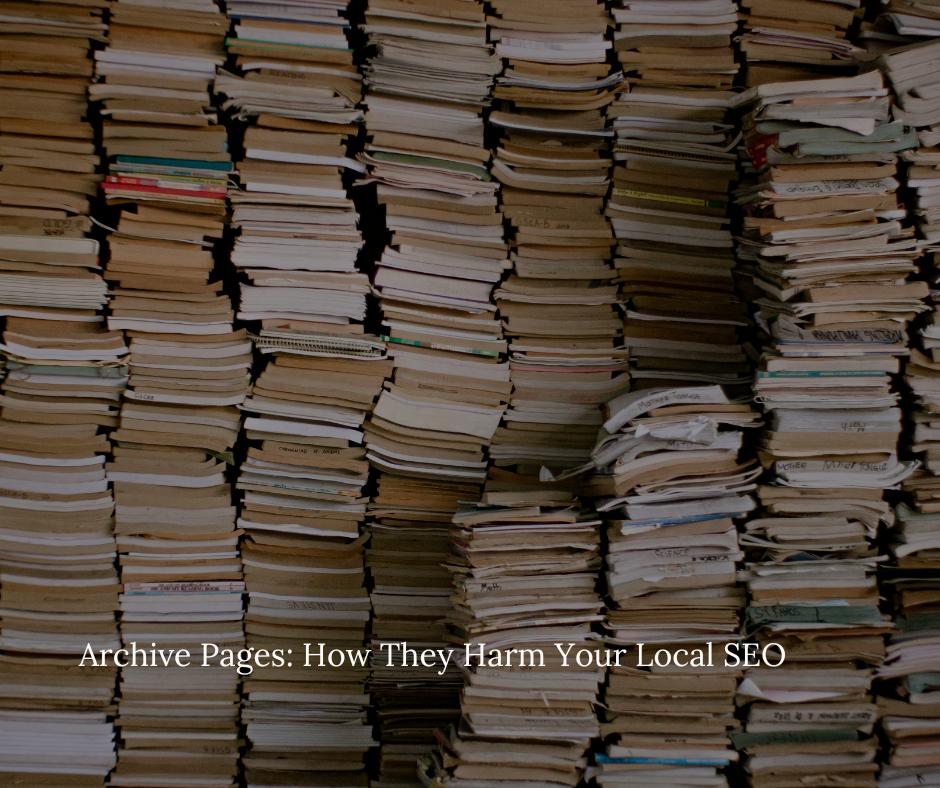
Archive Pages: What They Are, What to Do With Them, and How They Harm Your Local SEO
If you’ve tried optimizing your WordPress website for SEO, you’ve probably searched for your site in an incognito window—only to find a bunch of unwanted pages showing up in the results. Pages you didn’t create. Pages you don’t want indexed.
Sound familiar?
These are most likely archive pages—auto-generated by WordPress based on your site’s post metadata. And while they have a purpose, they can seriously hurt your local SEO efforts if left unchecked.
What Are Archive Pages?
An archive page is a type of listing page that displays multiple posts or pieces of content grouped by a shared attribute. These pages are automatically generated by WordPress (and other CMS platforms) based on specific criteria such as date, author, category, or tag. Their main purpose is to help users browse related content more easily by organizing posts under a common topic or filter.
Here are the most common types of archive pages:
-
Date Archives – Show all posts published in a specific month or year (e.g., June 2024)
-
Author Archives – Display posts written by a specific author
-
Category Archives – Group posts under a certain category, such as “SEO Tips”
-
Tag Archives – Organize posts that share the same tag, like “WordPress”
-
Custom Post Type Archives – List entries from a specific custom post type (e.g., “Projects” or “Case Studies”)
While archive pages can be helpful in certain use cases—like large blogs or media sites—they can also pose problems for SEO if left unmanaged.
When Archive Pages Hurt More Than Help.
For large blogs or news sites, archive pages can help users explore related content. But for small business sites or local service providers, these pages often lack custom content, Repeat what’s already found elsewhere, and Confuse search engines by duplicating content across multiple URLs.
Unless you’ve strategically planned and optimized your tag and category use, archive pages can become SEO dead weight.
Why You Should Block Archive Pages from Being Indexed.
Let’s be clear—you don’t always need to delete archive pages from your site entirely. In fact, some archive pages can be helpful for navigation and user experience, especially if they’re well-organized and lead to valuable content. However, in most cases—particularly for small business sites or local service providers—you should prevent many of these pages from being indexed by search engines.
Why?
Improves Crawl Efficiency
Google has a crawl budget—the number of pages it’s willing to index on your site. Archive pages consume that budget and reduce visibility for:
-
Your product or service pages
-
Fresh blog content or updates
Avoids Thin Content Indexation
Most archive pages show little more than:
-
Titles
-
Dates
-
Excerpts
This is considered thin content, which hurts your overall SEO quality. Blocking them keeps your indexed pages meaningful and valuable.
Prevents Keyword Cannibalization
If multiple archive pages rank for similar keywords:
-
You end up competing with yourself
-
Google may rank a useless archive over your main blog post
Strategic blocking helps Google focus on your most relevant pages.
How to Know Which Archive Pages to Block.
Start simple. Focus on:
-
Date archives
-
Author archives
-
Poorly planned tag and category archives
Then gradually rebuild and allow indexing on only those archive pages that drive traffic and offer real value. Use Google Search Console to monitor performance before making changes.
Bonus Tip: Watch Out for Weak Backlinks to Archive Pages
Sometimes, archive pages may have accumulated inbound backlinks, especially if you’ve shared URLs from category or tag archives in the past. When cleaning up or blocking these pages, it’s important to:
-
Redirect valuable links to high-performing blog or service pages
-
Reclaim backlink equity by pointing links to content-rich, optimized destinations
Want to learn how backlinks actually help SEO and how to apply them effectively across your site? Read our guide to SEO backlinks here.
Let’s Make Your Search Results Cleaner
Want to improve your local SEO and reduce the clutter in Google search results?
We can help. At HTX Website Designs, we specialize in optimizing WordPress websites and configuring SEO plugins like Yoast, Rank Math, and All-in-One SEO. These tools are powerful—but without the right setup, they won’t do the job alone.

Web Designs
A Houston Based Website Service
Houston, TX - Home Office
Sign Up To Our
Newsletter
Be the first to learn about new blog post & special offers.

